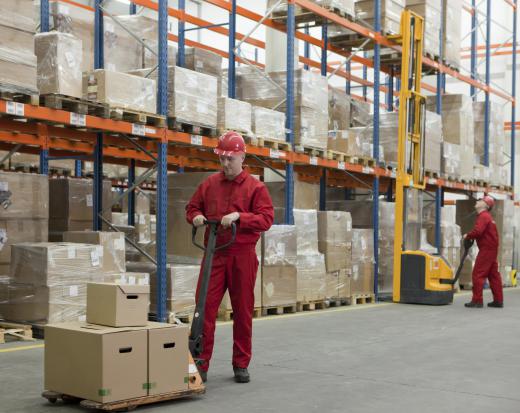A flatbed trolley is a transportation device used in factories, warehouses, and other industrial settings to move bulky loads across a space. The design of the flatbed trailer can vary, but the basic components include a flat surface on which goods can be placed or stacked, a set of casters on which the platform or bed will be supported, and a handle that will allow a user to push or pull the unit. The casters of the flatbed trolley can be made from a variety of materials, including hard plastic, pneumatic rubber, or even steel.
The bed of the flatbed trolley is usually made of some heavy-duty material such as steel, though wood planks can also be used. If heavier, bulkier items are being transported regularly, steel is usually used because it is exceptionally strong and durable. Wood can be used on the flatbed trolley if the items will not be heavy enough to crack or otherwise damage the wood. Steel mesh can also be used, and in rarer cases, composite materials or plastic. Regardless of the material used for the bed, the frame is usually made of steel or another heavy metal for stability and durability.

The casters are usually mounted at the four corners of the flatbed trolley, though in some cases wheels are also mounted in the center of the transport device. This is done to further aid in stability and steering. Sometimes the casters are fixed in a set position, though many flatbed trolley models feature one or more sets of rotating casters, which allow for easier steering. Trolleys that feature wheels mounted on an axle are rarer, though these trailers are useful for certain applications, especially hauling heavier goods in tight spaces.
If the flatbed trolley lacks a handle for the user to push or pull, the device is often instead called a dolly. The items being hauled would then need to be secured to the dolly, and the users would essentially push or pull on the item being hauled to move the dolly along. This is a more difficult process, but exceptionally bulky items can be centered on the dolly, whereas larger items might hang off the front of a trolley because the handles at the rear of the trolley would prevent the item from being centered.
